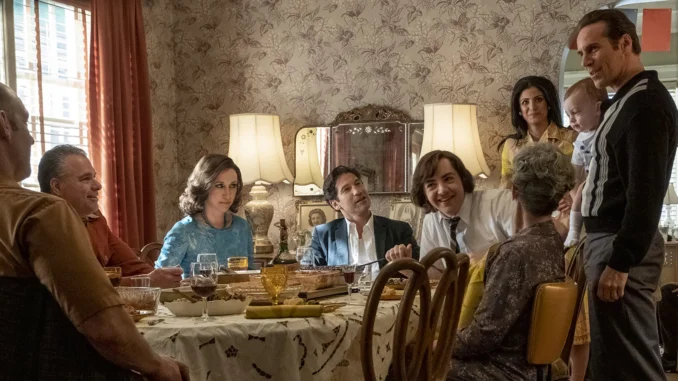
The world of The Sopranos continues to captivate fans, even years after its final episode aired. One of the most beloved characters, Carmela Soprano, played by Edie Falco, has left a lasting impression on audiences. With the release of the prequel film The Many Saints of Newark, fans were eager to see how the iconic character would be portrayed in a new light. However, not all scenes made the final cut, and Falco recently opened up about a poignant monologue that was ultimately omitted.
Reprising the Role of Carmela
Edie Falco has been a cornerstone of The Sopranos since its inception, portraying the complex and resilient Carmela. Her character provided viewers with a unique lens into the life of a mob wife, balancing loyalty to her husband Tony with her own desires and ambitions. When the opportunity arose to reprise the role in The Many Saints of Newark, Falco embraced it with enthusiasm.
“I came in, and I did a monologue,” Falco told IndieWire. “I’m embarrassed that I don’t know what [exactly] it was about. It was Carmela as if she was musing on the old days, and then the movie began.” This glimpse into Carmela’s reflections offered a nostalgic connection to the beloved series, giving fans a taste of her internal struggles.
The Experience of Returning
Falco reminisced about stepping back into Carmela’s shoes, saying, “All these years later they’re doing my hair, putting on jewelry, putting the nails back on, it was like a serious trip.” The familiarity of the process felt like a homecoming. She expressed her fondness for the crew and the collaborative spirit that defined The Sopranos.
Despite the excitement, the reality of her scene being cut was a disappointment. “What a flippy day that was,” she said, reflecting on the bittersweet nature of returning to a role she cherished.
The Many Saints of Newark: A Fresh Take
Set decades before the events of The Sopranos, The Many Saints of Newark focuses on a young Tony Soprano (played by Michael Gandolfini, the son of James Gandolfini) and his mobster uncle Dickie Moltisanti (Alessandro Nivola). The film dives deep into the early influences that shaped Tony into the man he would become, showcasing a world rife with crime, family dynamics, and moral ambiguity.
New Faces and Familiar Stories
The film brings in a fresh cast portraying younger versions of classic characters. Corey Stoll takes on Junior Soprano, Billy Magnussen embodies Paulie Walnuts, John Magaro steps into Silvio Dante’s shoes, and Vera Farmiga portrays the formidable Livia Soprano. While these performances provide a nostalgic connection, they also bring a new energy to the franchise.
Critics have noted that The Many Saints of Newark stands on its own while still paying homage to the original series. Clarisse Loughrey from The Independent highlighted that the film conveys timeless themes of power and innocence, echoing the fatalistic undertones that defined The Sopranos. She remarked, “Such fatalistic ideas were already the lifeblood of David Chase’s celebrated mob drama… But here they’re delivered with that quiet ache that can only come with the passing of time.”
The Cultural Legacy of The Sopranos
The lasting impact of The Sopranos on television and popular culture is immense. Its complex characters, intricate storytelling, and exploration of moral ambiguity set a new standard for what could be achieved in the medium.
A Masterclass in Character Development
Carmela Soprano is a prime example of how The Sopranos allowed for rich character development. Her struggles, aspirations, and contradictions made her relatable to audiences, showcasing the dualities of love and power within the context of mob life. The fact that Falco was given the opportunity to reflect on Carmela’s past in The Many Saints of Newark speaks volumes about the character’s depth and relevance.
Nostalgia and New Narratives
As much as fans treasure the original series, the prequel film taps into the nostalgia that surrounds The Sopranos. However, it also presents new narratives, allowing viewers to explore the backstories of familiar characters. This balance between nostalgia and innovation is essential for keeping the legacy alive while introducing fresh perspectives.
The Power of a Cut Scene
Even though Edie Falco’s monologue didn’t make it into the final version of The Many Saints of Newark, the fact that it was filmed underscores the creative process behind storytelling. Cut scenes can often hold significant emotional weight and contribute to a character’s journey, even if they don’t make it to the final edit.
What Was Lost?
While we may never know the full impact of Carmela’s cut scene, its existence indicates a deeper exploration of her character’s emotional landscape. The reflections of a woman who navigated the complexities of love, loyalty, and ambition would have added layers to her story, enriching the overall narrative of the film.
Conclusion: A Lasting Bond
The connection between Edie Falco and Carmela Soprano is undeniable. As she looks back on her experiences with The Sopranos and The Many Saints of Newark, it’s clear that both projects are woven into the fabric of her career. Though the cut scene may have been a missed opportunity, it remains a testament to the enduring legacy of Carmela and the world of The Sopranos.
The exploration of character, family, and moral complexity will continue to resonate with audiences, ensuring that both The Sopranos and its prequel remain cultural touchstones for years to come.
